From achieving product-market fit, securing funding, and growing from a local to a global company, startup mentors are crucial for each stage of your journey.
At MentorCruise, we have multiple startup founders who have taken businesses from zero to one, and scaled from one to millions of dollars.
In this article, we'll cover:
- What a startup mentor is
- Types of startup mentors, and why they are important
- Popular startup mentors
- What makes startup mentors different from startup advisors
- Benefits of startup mentors, and how to find them
- How much startup mentors cost, and best practices for dealing with them
What is a startup mentor?
Startup mentors are professionals who have enough expertise and experience in the startup ecosystem, or who have been founders themselves.
They also have worked closely with many startups in different capacities, whether as investors, growth specialists, or advisors.
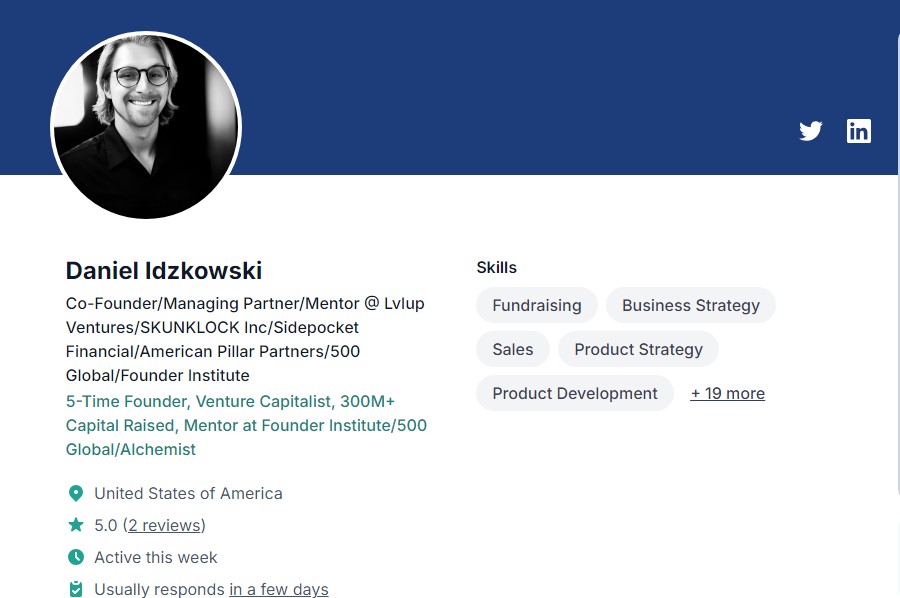
For instance, Daniel Idzkowski, a startup mentor on MentorCruise, discusses how important mentorship is in guaranteeing startup success, by helping founders avoid big mistakes and learn to navigate entrepreneurial challenges from scratch.
With years of exposure to different startups, these individuals gain a strong understanding of what makes a startup fail or succeed, which qualifies them to be mentors.
Different types of startup mentors
Generally, there are four different types of startup mentors.
1. Veterans
Veterans are successful entrepreneurs who have been in the startup space for decades. They've seen different startups come and go. Some successful, many not so successful, and many other startups sunsetting due to loss.
They're like the wise old sages, the ones who people look up to for timeless wisdom. Veterans are everyone's dream mentor.
2. Specialists
Specialists are experts in a particular industry. They can help you navigate your way through a domain you may find challenging.
For example, say you want to run ad campaigns for a new product launch. A specialist in creative ads development and consumer psychology can help you position your product better.
Likewise, a pay-per-click ads expert can give you strategies that will make your ads more lucrative.
3. Peers
Peers are fellow entrepreneurs or start-up founders. They're also on the same journey as you, trying to find their feet or scale their venture.
They can serve as accountability partners, and help uncover blindspots in your business.
With peers, it's more like a mutual mentorship relationship. You're both mentoring and being mentored by each other.
4. Operators
Operators help you scale your processes, integrate different workflows, and ensure they run smoothly.
For example, if you want to build a remote team, an operator can help you choose the best communications platform, and the tools needed for your startup to run productively.
Startup mentors vs. Startup advisors
Startup mentors are more like guides, helping your startup succeed as a whole and avoiding costly mistakes. They offer a broad perspective on your business, from funding, to managing your team effectively, networking and forming strategic partnerships.
On the other hand, start-up advisors are experts in a particular domain. Their role is similar to specialist mentors. They help you do better in a specific area where you lack expertise.
For example, you can have an advisor for legal matters, to make sure you're not going against any law or regulations. Or you can have a digital media and public relations advisor helping you maintain a favorable position in the hearts of your customers.
Popular startup mentors
Rok Strniša
Rok Strniša is a founder, entrepreneur, and software architect with over 15 years of experience in the IT space.
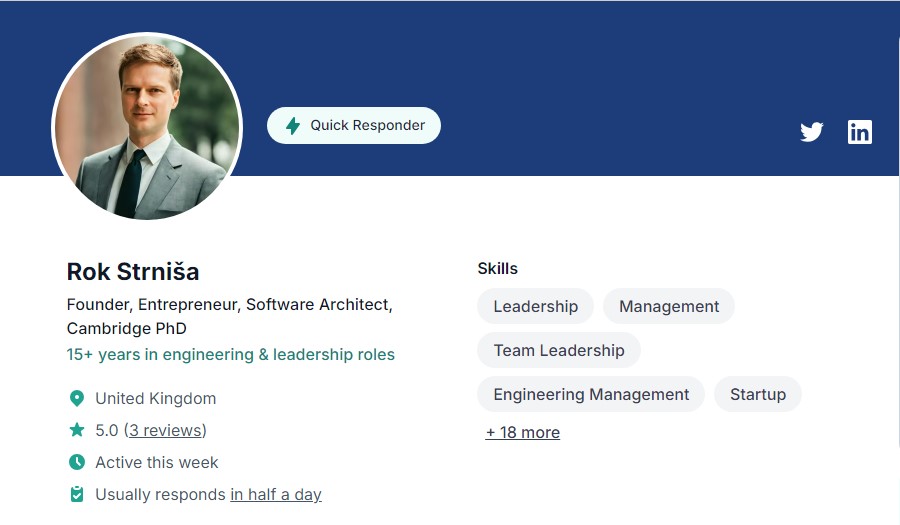
Rok has seen startups from various angles. With his wealth of experience in tech leadership, management, building a startup, interviewing and recruiting, he guides other startup founders towards outstanding results, scale, and profitability.
Márcia Monteiro
Márcia Monteiro is an operations specialist, currently serving as the Chief Operations Officer (COO) at Interventional Systems.
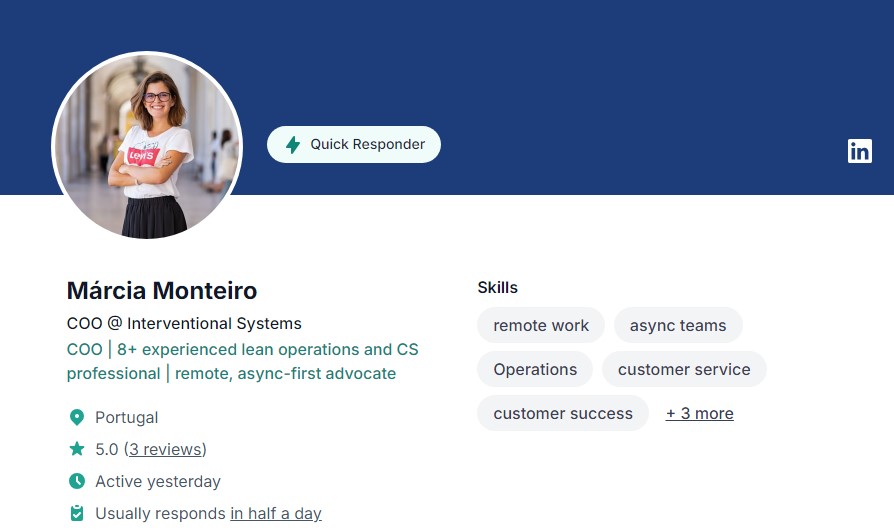
She has nearly a decade of experience in different startup environments. She specializes in helping startups scale through Lean process improvements and building team development.
Whether you’re a new startup trying to find your feet, or a mid-level startup looking to accelerate your growth, Márcia is the mentor for you.
Dominic Monn
Dominic Monn is the founder of MentorCruise. He has experience scaling businesses, backed up by the success of MentorCruise without any outside investment.
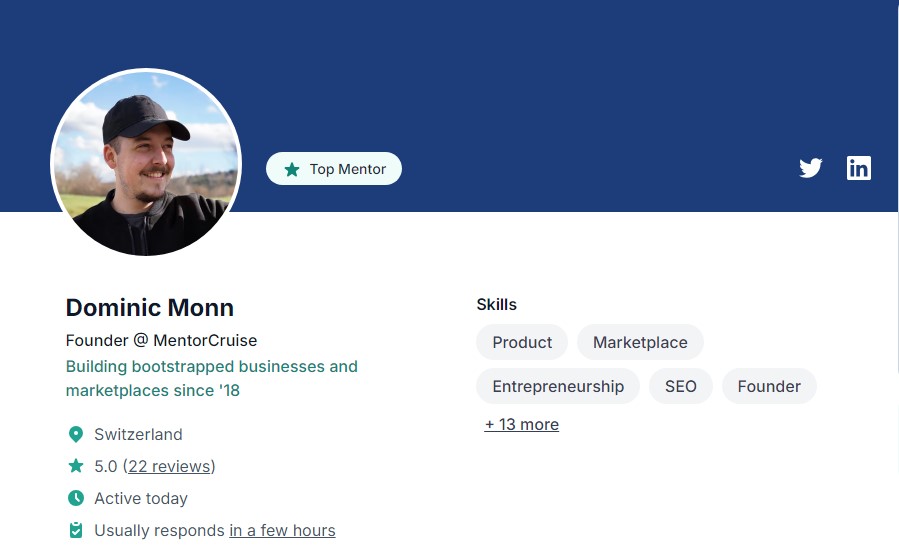
In 2021, he shared his story of how he was able to steer MentorCruise from a screwed MVP to an $8k MRR bootstrapped startup in 3 years.
From 2018 to 2022, he launched 13 side projects, out of which he's sold four, with six of them failing, and two being on autopilot.
Peter Thiel
Peter Thiel is the author of Zero to One, a popular book amongst startup founders. He co-founded PayPal, and has invested in many successful startups over the last couple of decades.
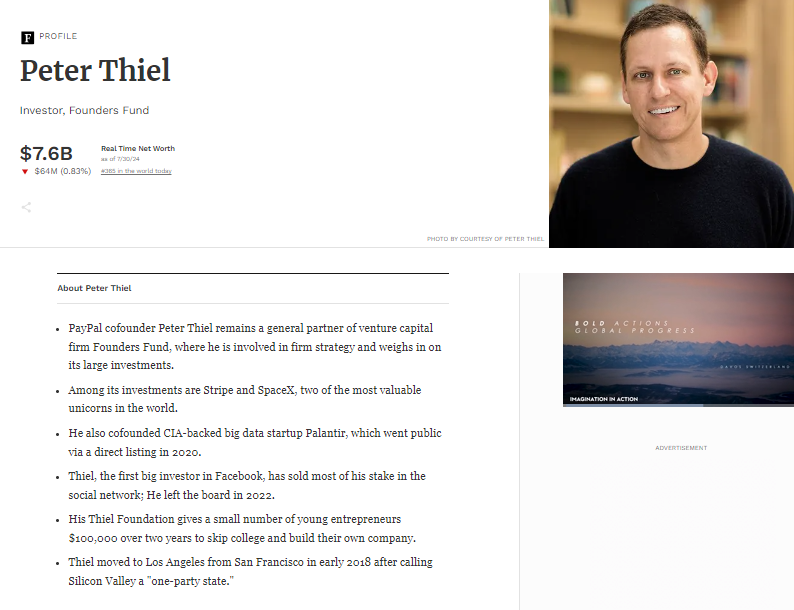
A veteran in this field, he is also a partner at Founders Fund, a venture capital firm in Silicon Valley that has invested in companies like SpaceX and Airbnb.
Why are startup mentors important?
Starting your own company is hard. According to Startup Genome, about 9 out of 10 startups fail.
Just like every other endeavor in life, learning from those ahead of you can shorten your learning curve and increase your odds for success.
Without startup mentors, you'll spend longer trying to learn the ropes of building a successful venture, hiring the right team, monetizing, or scaling a business.
You could also encounter compliance issues with regulatory bodies, ending up paying huge fines or even shutting down.
According to an analysis by Endeavor Insight looking at data spanning 10 years from 2003 to 2013, 33% companies saw success as top performers when their founders were mentored by top performing entrepreneurs. On the other hand, only 10% of the companies could succeed as top performers without a startup mentor.
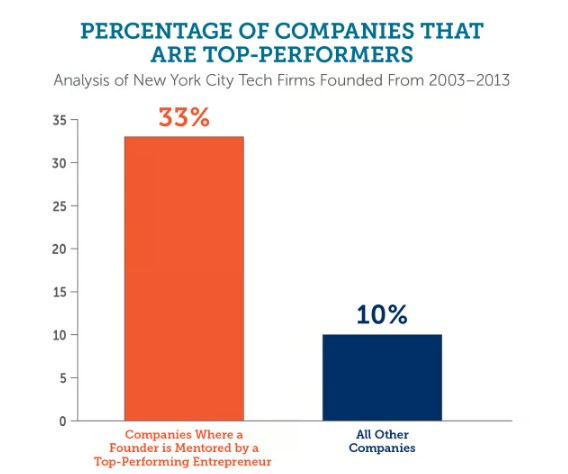
Source: Endeavor Insight analysis
Even entrepreneurs like Bill Gates and Mark Zuckerberg realized the role mentors played in their success story.
Although having a startup mentor doesn't mean you'll never fail or encounter challenges, their timeless wisdom can help you overcome challenges, and even avoid some problems right off the bat.
Benefits of startup mentors
Shorten your learning curve
If you try to do it on your own, you could spend valuable years just figuring things out.
But with mentors, you can make significant progress while learning.
Take Danny Postma for example. He spent almost half a decade growing his first start-up, but didn't generate any revenue. After that, the lessons he learned helped him launch a product that he sold for $1 million dollars within 8 months.
If he were to mentor someone else, the person would definitely not have to spend that long to move their startup in the right direction.
By leveraging the failures of mentors, you gain practical knowledge to grow your startup without having to fail for too long.
Wisdom in critical situations
Questions like how to hire team members, when would you need a CEO, how to share equity with founding members, and the likes, are not easy to answer. Especially as a first timer.
Not that your mentor will make those decisions for you, but they can share their experience in different scenarios, which will help you to make better decisions.
Help with networking
Mentors can introduce you to people who are vital for your company’s success. There are some circles you can't get into without recommendations or referrals.
A mentor can introduce you to investors, partners, and even other specialists you can connect with to help your business grow.
How to find startup mentors
Finding a mentor can be really hard, because entrepreneurs are usually the busiest people.Nevertheless, there are a handful of ways to go about it.
Mentorship platforms
This is a sure bet for finding mentors for your startup, because that is what these platforms are made for— to connect mentees with seasoned entrepreneurs who can help them build successful startups.
At MentorCruise, we have connected mentees with the right startup mentors for over half a decade. We provide 1-on-1 mentorship across different areas, including startups and entrepreneurship.
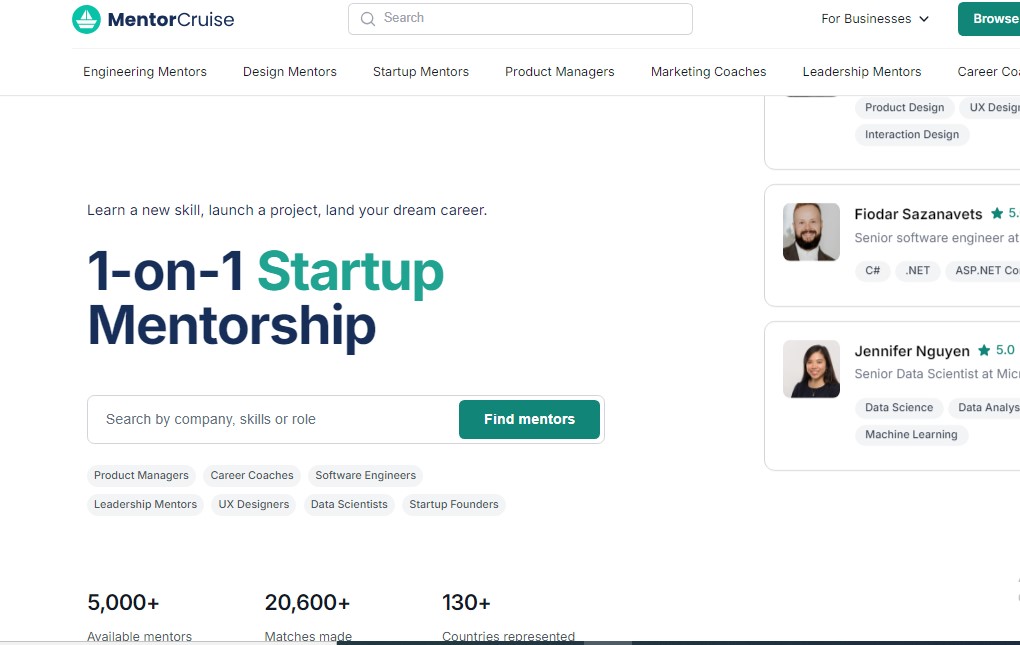
Some of the benefits of a mentorship platform include:
- A collection of great mentors in one place. No matter the kind of mentor your startup is looking for, you can find them without breaking a sweat.
- Vetted mentors. You rarely have to worry about a mentor’s track record because a mentorship platform assesses would-be mentors before allowing them to render their service.
- A streamlined communication channel. Hold meetings, chat, and share files all in one place.
- Clear schedules for live meetings, with ongoing support from your mentor in between.
Join a start-up program
There are different startup programs that teach candidates about how to build, run, and scale startups, and also connect them with mentors, investors, co-founders, and even employees.
These are especially found in areas known for technological development like Silicon Valley. An example is the startup accelerator, Y-combinator.
The downside is that these programs may not accept you if you don't meet their criteria. Also, if there aren't such programs nearby, you'll have to spend a whole lot for enrolling, traveling, and benefiting from them.
Online forums
There are communities dedicated to startups which you can browse through Quora or Reddit. Reaching out to enough people in these online forums can help you connect with a mentor.
A great platform for independent start-up founders is Indie Hackers. Most of the founders there are individuals who scaled businesses from the ground up, without relying on outside investors.
You can get startup advice, and also learn from stories of startups that failed and succeeded.
Social networks
You can also reach out to founders and specialists on platforms like X (Twitter) and LinkedIn. To successfully get a mentor via social media, try and connect with the people you want to get mentored by first. Show them that you value their work, before dropping your proposal of becoming their mentee.
Note that not everyone you reach out to will take you up on your offer, so you have to keep trying until you find a good fit.
Conferences and networking events
Conferences are a good place to catch entrepreneurs who may be willing to mentor you. They may be speakers or fellow attendees, and you need to plan ahead accordingly if you want to make this work.
Research about your potential mentors, and rehearse what you’ll say to them if you get a chance. Approach them respectfully at the conference, and strike up a conversation with them.
You can use their talk as a conversation starter. After establishing rapport, drop your proposal of having them mentor you.
Cold outreach strategies
Another useful way of getting a mentor is by sending out cold emails. Cold email simply means you're sending a personalized email to someone with no prior contact to spark up a business conversation.
To succeed with cold emails, look out for two things:
- Research: make sure you know as much about the person as possible. When you're genuinely interested in someone and have spent hours learning about them and their work, it will reflect in your email.
- Personalization: You might have come up with a list of 10 to 50 people you'd love to be your mentors. Sending out the same email to all of them, after only tweaking their first name will most likely get you a no. But by writing a thoughtful pitch for each individual by acknowledging their work and personality, you increase your chances of landing a mentor.
What will it cost to get a startup mentor?
A professional mentor-mentee relationship can cost between $200 to $500 monthly on average. How often you meet, and how much time you expect your mentor to dedicate will eventually affect the price.
Ideally, mentorship isn’t a paid relationship.
You find someone you believe you can learn from, reach out to them to help you through a challenge, while they share insights which you implement and come back with results. But it’s easy to lose motivation at times, and your mentor may not feel obligated to always be there for you.
With the incentive of a few hundred dollars, there’s a sense of commitment from both ends, and your mentor is more motivated to help you achieve your goals.
Best practices for success with startup mentors
Although working with startup mentors can fuel your business to launch into the skies, it comes with its challenges that, if you can not manage properly, can do more harm than good.
To get the best results, follow these best practices:
Know what to expect from the relationship
Some people go into mentorships with wrong or unrealistic expectations. A mentor isn't a silver bullet that will automatically take away all your troubles.
Instead, they will guide you through those challenges so you don't give up. Your startup mentor can also give you foresight, so you know how to jump over some hoops before you eventually encounter them.
Sometimes, just knowing there's someone who has gone through the same challenges as you and come out stronger is all you need.
Also, it's important to have SMART goals (goals that are specific, measurable, achievable, relevant, and time-bound) so you can measure progress from your relationship with your mentor.
Pick the right mentor
Picking the right mentor tailored to your unique situation is crucial for success. A mentor that worked for someone else may not necessarily work well for you.
Some things to look out for when picking a mentor include experience in the startup ecosystem, expertise in your domain, and the willingness to see others grow.
While status and wealth can be attractive, don't base your choice on flashy things alone.
It is also good to find mentors who have the same values as you, else you might have a hard time working with them from battling internal conflicts.
Some marks of a good mentor are:
- Experience and expertise in your domain
- Effective communication
- Integrity and trustworthiness
- Inspiring and motivating
Be respectful and professional
Value your mentor’s time. The best mentors are usually very busy people, so whenever you agree to meet, be punctual.
Also, prepare for your meetings ahead of time, come up with questions and if anything they’ve shared has helped you get ahead. Whether you’re making a sound decision, or navigating through a challenge, it’s good to tell them about it.
Furthermore, it’s important to draw the line between personal and professional matters. Don’t probe into your mentor’s personal life. If they decide to share some personal experience in a bid to help you, keep it private.
Stay open to feedback
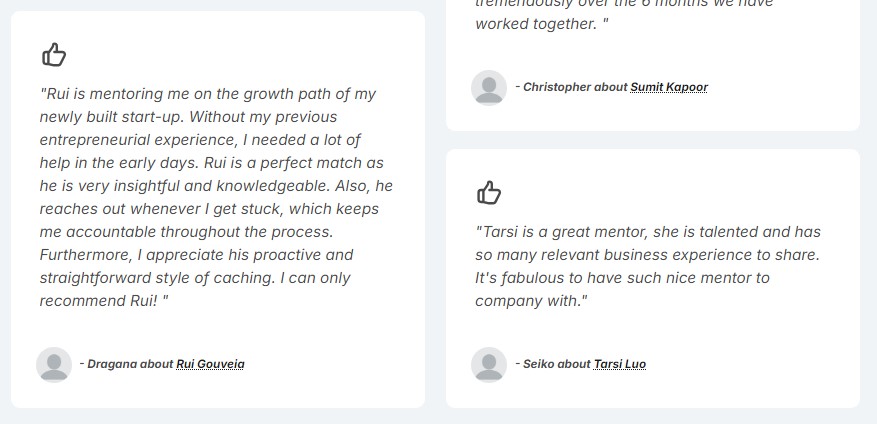
While you’ll be the one to ultimately make the decisions for your startup, it’s good to consider what your mentors tell you deeply.
Occasionally they may come off as harsh or having too high a standard, but it’s this very stretching that will help you grow and push you towards your goals.
Nurture the relationship
This is especially important if your startup mentor is doing it out of their own will, without any form of compensation.
You’d have to strike a balance between keeping the relationship alive, and not becoming a disturbance to your mentor.
Find your best-fit startup mentor with MentorCruise
Startup mentors can be the driving force that propels your idea to the next level. From seasoned veterans who have successfully built and exited multiple startups to specialists with deep expertise in areas like marketing, product development, or fundraising, mentors come in all forms.
Finding a mentor who aligns with your startup’s needs can make all the difference, giving you a roadmap to turn your vision into a thriving business.
Get mentoring from our trained, experienced experts on MentorCruise and get on the career track you want to be.







